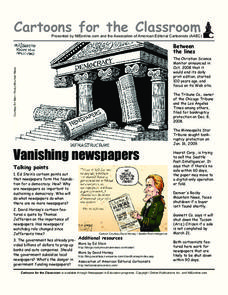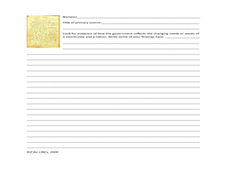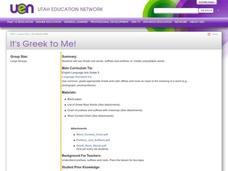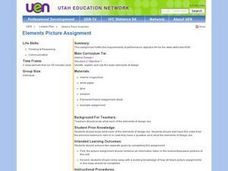Curated OER
The Electoral Process
Students explore the U.S. political system by completing several worksheets. For this government election lesson, students define and describe the two main political parties in detail to one another. Students read a piece written by a...
Curated OER
Redistricting: Drawing the Lines
Difficult redistricting concepts are covered in a context that will make it understandable to your government scholars. They begin with a KWL on the term redistricting and then watch a video to answer some questions. They analyze...
Curated OER
Cartoons for the Classroom: Vanishing Newspapers
What is happening to our newspapers? In the context of the current trends of media and the ever-declining print news industry, this handout includes two political cartoons for pupils to analyze, both created by artists working for...
National Endowment for the Humanities
The Preamble to the Constitution: A Close Reading Lesson
"We the people of the United States, in order to form a more perfect union..." These familiar lines begin the Preamble to the Constitution, but do learners know what they mean? A close reading exercise takes a look at the language of the...
Curated OER
Do Presidential Candidates Need to Be Good Debaters?
Blogs can be a good way for learners to engage in writing, critical thinking, and social media in a formal way. The New York Times has provided learners age 13-18 with an article, background information, and several prompts to get them...
Constitutional Rights Foundation
Puritan Massachusetts: Theocracy or Democracy?
Was Puritan society governed as more of a theocracy or democracy? After comparing and contrasting a series of primary source documents, middle and high schoolers form small groups and debate the question.
Curated OER
Towards Separation of Church and State in Gloucester
Explore New England government in the 1700's with your class. They will identify historical documents as primary or secondary sources, then read and discuss the significance of these documents as they relate to the "freedom of religion"...
Learning to Give
It's Never Too Late: Air Quality
What are the causes and effects of pollutants on the quality of the air we breathe? Groups research emission standards, emission controls, career opportunities in the area of air quality control, and things government and individuals can...
Japan Society
Changing Times, Changing Styles: New Japanese Literary Styles of the Late Nineteenth Century
Focusing on Doppo's "Unforgettable People" and late nineteenth century Japanese literature, this resource also leads to discussions of form being dictated by content. Explore the development of new literary styles first-hand by...
Constitutional Rights Foundation
What Is Constitutional Democracy?
Rediscover the values at the heart of American democracy and what makes it unique with your pupils. Use a reading and discussion questions—in addition to an analytical activity—on the preamble to the Constitution. An additional activity...
Curated OER
It's Greek to Me!
Use Greek roots, suffixes, and prefixes to create polysyllabic words. Readers use the dictionary to identify what the word's prefix, suffix, and root or base word mean. They define what a syllable is and how one is formed using Greek...
Curated OER
Lesson: Allison Smith: What Are You Fighting For?
Trench art is a nontraditional art form created by soldiers in trenches during wartime. Artist Allison Smith connects her art to the American Revolution and the question: "What are you fighting for?" Kids examine her art, how it connects...
K12 Reader
Import/Export
The reading passage here uses the example of the American colonies to introduce imports and exports. After reading the text, class members respond to five questions, which require pupils to find facts in the text and form opinions about...
Curated OER
Beginning Your Inquiry
If you're starting a research project, use this guide to help young learners form the inquiry for their research. With steps that outline the entire process, including note taking and gauging the quality of an inquiry question, this...
What So Proudly We Hail
Life, Liberty, and the Pursuit of Happiness: A Lesson on the Declaration of Independence
What does it mean to say that a right is unalienable? How did the founding fathers convey this revolutionary concept in the Declaration of Independence? Engage in a close reading and analysis of the Declaration of Independence, and...
US Environmental Protection Agency
A Mock Town Meeting on a Proposed Tank Farm
Intended as a follow up to the Protecting Your Drinking Water activity, young environmentalists use their assessment of the a hypothetical town's water supply to debate the installation of underground chemical storage tanks. With the...
Fluence Learning
Writing an Argument: The NIEHS
Should the work of the National Institute of Environmental Health Sciences be funded by the government? Middle schoolers weigh in on the status of federal funding for programs that protect the environment with three text passages and...
Curated OER
The False Parliamentarism of 1791 (3rd Canadian constitution)
High schoolers gain an understanding of the concept of false parliamentarism after the Constitutional Act. They, in groups, represent different members of government as they draft, debate and try to pass a bill into law.
Curated OER
It's Symbolic!
Students use symbols to represent different government and economic systems. They explain how the nonprofit organizations and governments work together to supply needs. They interview a foreign exchange student and complete a chart with...
Curated OER
Political Movement: Political Parties
Pupils explore politics by researching Australian government law. In this political parties lesson, students define the different active parties in Australia and their roles within the country. Pupils complete a word bank activity and...
Curated OER
Elements Picture Assignment
Learners identify the basic structural and decorative designs, create examples of line (horizontal/vertical/curved/diagonal), as well as identify and explain the difference between shape and form. Then, they identify and explain the use...
Curated OER
Vocabulary: English in a Government Office-Part 1
In this foreign language worksheet, students fill in the blank on ten sentences. Each sentence is a statement that a person might say when visiting a government office. Vocabulary terms include terms such as license, identification, and...
Curated OER
Vocabulary: English in a Government Office-Part 2
In this foreign language worksheet, pupils complete each of ten sentences. They read the sentence and choose the best choice from three options. Each sentence is a phrase a person might use when visiting a government office.
Curated OER
President for a Day
Students explore the duties of the US President. In this history lesson plan, students use research to gain information about presidents. Students utilize various forms of research, pictures, library books, textbooks, newspaper,...
Other popular searches
- Compare Forms of Government
- World Forms of Government
- Ancient Forms of Government
- Four Forms of Government
- Forms of Government Rating=3
- Many Forms of Government
- Forms of Government 2nd
- Forms Government Lesson Plans
- Different Forms of Government
- Forms of Government Intervent
- Greek Forms of Government
- Forms of Government Inter Vent

























